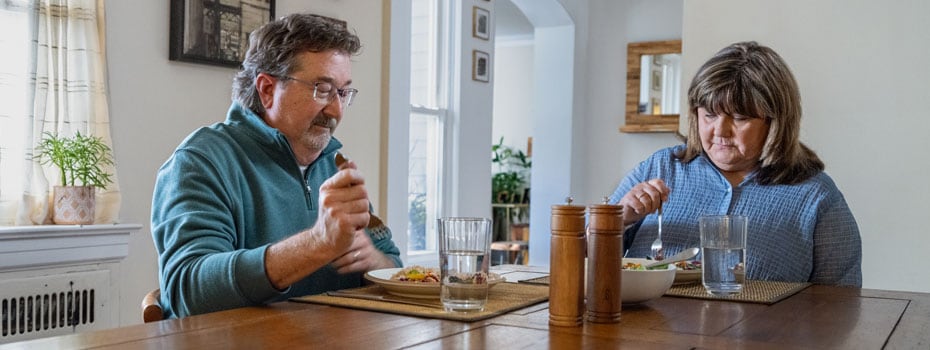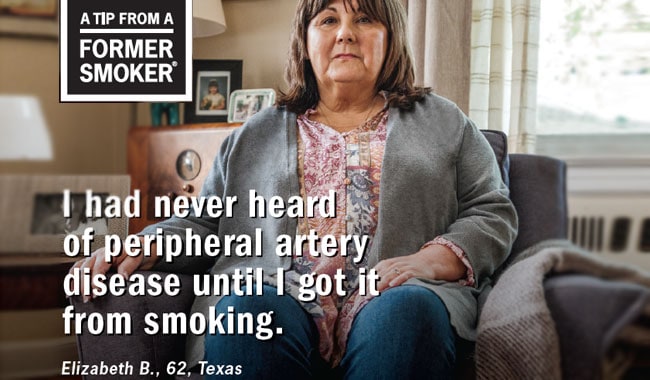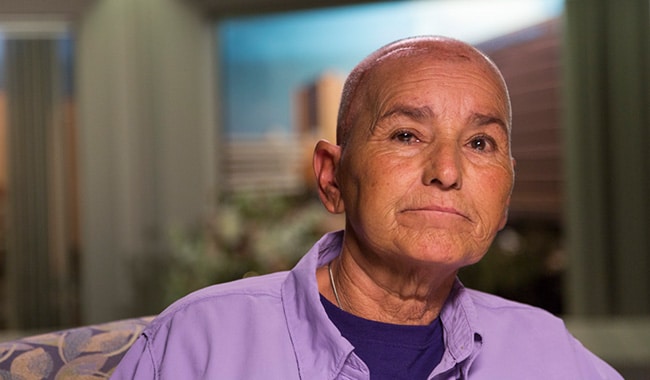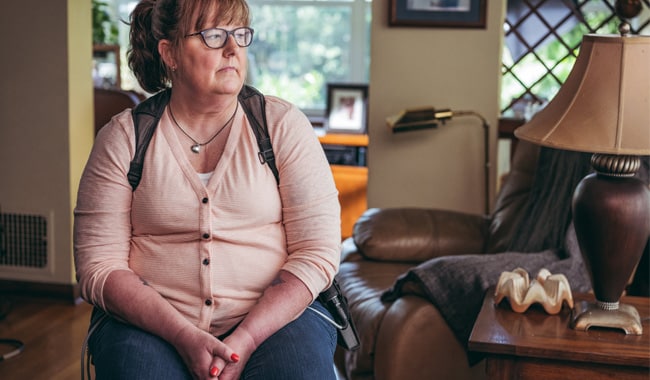Elizabeth B.’s Story

Elizabeth, age 62, started smoking menthol cigarettes at the age of 18 because her friends and co-workers smoked. Within a year, Elizabeth was smoking about a pack and a half a day. She smoked at home and work and participated in activities where she could smoke. “Everything revolved around the ability to smoke,” she said. “I was a prisoner to my addiction.”
When Elizabeth was 42 years old, she had a stroke. Doctors advised her to quit smoking immediately, but Elizabeth continued to struggle with nicotine addiction for another 10 years. She tried to quit multiple times using various strategies. Then, when she was 52, something clicked. She set a quit date, threw away her ashtrays, changed routines connected to smoking, and used nicotine patches. Using a combination of strategies, Elizabeth finally quit smoking for good.
Two weeks later, Elizabeth started dating her future husband, Stephen. The pair enjoyed taking long walks together, until Elizabeth started experiencing numbness in her feet and cramping in her calves. She was diagnosed with smoking-related peripheral artery disease (PAD), a condition in which her arteries had narrowed and blocked the flow of blood to her legs. Just four months after she and Stephen married, Elizabeth had to have major surgery to restore blood flow to her legs.
In more recent years, Elizabeth has developed kidney cancer. But she feels that PAD is her biggest challenge to everyday living. She can no longer take the stairs. Walking is painful but critical to saving her legs from amputation, so she and Stephen make taking walks a daily priority.
Elizabeth shares her personal experience with smoking-related diseases and provides support to others who are struggling with PAD. “If I had never smoked that first cigarette, I may not have lit the fuse for PAD,” she said. “My goal is to help other young people never start smoking.
Persons with disabilities experiencing problems accessing these videos should contact CDC-INFO at CDC-INFO email form: https://www.cdc.gov/info, 800-232-4636 or the TTY number at (888) 232-6348 and ask for a 508 Accommodation PR#9342. If emailing please type “508 Accommodation PR#9342” without quotes in the subject line of the email. Please include the URL of the site in the Subject line of your email request that you would like to access.
View more Tips videos sorted by name, disease and specific groups
Elizabeth B.’s Biography
Elizabeth, age 62, grew up in Texas and started smoking menthol cigarettes at the age of 18. Her friends all smoked and she felt peer pressure to smoke too. “I thought it made me look classy,” she said.

Within a year, Elizabeth was smoking about a pack and a half of cigarettes every day. She didn’t think about the harmful health effects of smoking. She believed the commonly held myth that smoking menthol cigarettes was somehow less harmful than smoking non-menthol cigarettes. Later, she learned the truth: menthol cigarettes are just as dangerous as regular cigarettes.
After high school, Elizabeth worked as a nurse’s aide in a hospital. “Everyone smoked,” she remembered. “The doctors, the nurses, even the patients were smoking in the hospital.” She thought to herself, if the doctors are smoking, how bad could cigarettes be?
Elizabeth smoked at home and at work. She enjoyed any outing or activity where she could smoke. “Everything revolved around the ability to smoke,” she said. “I was a prisoner to my addiction.”
When Elizabeth was 42 years old, she had a stroke while at work. She was trying to type when she realized that she couldn’t raise her arms. Her face started drooping and her words came out jumbled. In the hospital, Elizabeth repeatedly asked the nurses to let her go outside for a cigarette.
Doctors warned Elizabeth that continuing to smoke would increase her risk of having another stroke, and they advised her to quit smoking immediately. But her struggle with nicotine addiction continued for another 10 years. She tried to quit multiple times using various strategies. Then, when she was 52, something clicked. She read websites and brochures about how to quit and followed their advice: she set a quit date, threw away her ashtrays, changed routines connected to smoking, and used nicotine patches. Using a combination of those strategies, Elizabeth finally quit for good.
Two weeks later, Elizabeth went on her first date with her future husband, Stephen. The pair enjoyed taking long walks together. Then Elizabeth started experiencing numbness in her feet and cramping in her calves. The pain kept getting worse. When she could no longer walk the short distance to her mailbox, Elizabeth went to the doctor. Years of smoking had caused Elizabeth’s arteries to narrow and block the flow of blood from her heart to her legs, a condition known as peripheral artery disease (PAD). She learned that smoking increases the risk of PAD and can make PAD symptoms worse.
Just four months after she and Stephen married, Elizabeth had major surgery to restore blood flow to her legs. The surgeon asked if the newlyweds had wills and other end-of-life documents. “The hardest part was, I felt like Stephen didn’t sign up for this,” Elizabeth recalled. “I actually asked him if he wanted to have our marriage annulled.”
In more recent years, Elizabeth has developed kidney cancer. But she feels that PAD is her biggest challenge to everyday living. She can no longer take the stairs. Before going to a concert or baseball game, she reviews a map of the venue to make sure she can get around safely. Although painful and tiring, walking is critical to saving her legs from amputation, so she and Stephen try to walk at least a mile or two every day. When Elizabeth feels like she can’t do it, Stephen is there to encourage her.
Today, Elizabeth devotes her time to building awareness for PAD. She shares her personal experience with smoking-related diseases and provides support to others who are struggling with PAD. “If I had never smoked that first cigarette, I may not have lit the fuse for PAD,” Elizabeth said. “My goal is to help other young people never start smoking.”
More About Elizabeth B.
More Real Stories about heart disease / stroke:
























